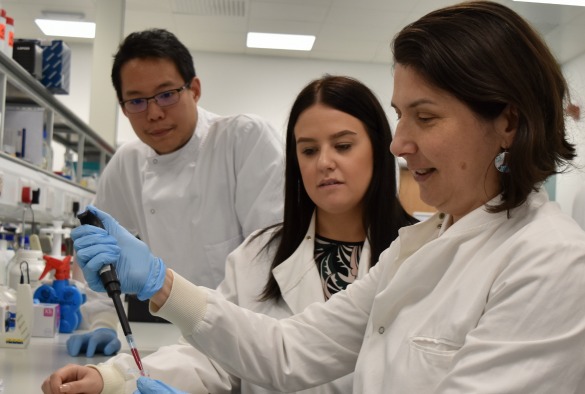
Wasu Supharattanasitthi (far left) and colleagues
Wasu is a PhD student in the University’s Department of Eye and Vision Science, Institute of Ageing and Chronic Disease. He is part of the Ocular Molecular Biology and Mechanisms of Disease group.
“I graduated with an Honours degree from Faculty of Pharmacy, Mahidol University, Thailand. During the professional practise training, I improved my knowledge about the medical care system in my country and the challenges it faces. It was during this time that I decided to further extend my education aiming to become a key person who guides not only practical knowledge but also morality and development through cutting edge research in pharmacy field.
“Therefore, I decided to work as an assistant instructor in the same university and look for higher education opportunities to develop my speciality. In mid-June 2014, I was awarded one of Liverpool – Mahidol Partnership Scholarships. And finally, I got here.
Big challenge but you’ll never walk alone in Liverpool
“There are so many general issues related to overseas students, such as: being far away from home, speaking another language, finding and getting used to a new environment, meeting new people, learning new cultures, etc., especially as I had never travelled abroad before and most of my time was spent in Bangkok.
“However, the main decisive reason for me to leave my city and embark on this journey for study was my now supervisor’s words during the first Skype meetings that she trusts me. This made me trust in her as well and helped with my initial worries.
“First impressions – Liverpool is a nice city with friendly, welcoming people. In addition, we can enjoy the rain during summer! Most importantly, I feel that if/whenever I have a problem, I always have people who are beside me. Because PhD study is not just studying, you should have great support. It was seen during my first year of study when I faced a very sad personal event; I could pass through that tough time with the help and understanding of kind supervisors, staffs and friends, both Liverpool and Bangkok. All of these made me realise that “the life is not as easy as you thought” and to be a professional or an expert, you don’t have to take all heavy responsibilities by yourself. World moves forward too fast. Dealing with everything by yourself might be old fashioned.
New window for world-class research
“The project I am working on makes use techniques at the forefront of development. With the new era of gene editing technique, we can manipulate specific site of various genomes.
“Our group is interested in Cystatin C a protein that is produced by the cells in your body. Production of this protein declines with ageing and has relevance for the development of Age-related Macular Degeneration (AMD).
“A part of my project is to generate the new model of disease-related variant cystatin C in induced Pluripotent Stem Cells (iPSCs) then differentiate them to the pigmented layer of retina for further studies.
“An iPSCs is a cell taken from any tissue (usually skin or blood) from a child or adult and is genetically modified to behave like an embryonic stem cell.
“This work also involves collaborators in the UK and at the National Institutes of Health in the USA. Moreover, the plan in this investigation can be used or applied as a roadmap for age-related and neurodegenerative diseases to clarify their mechanisms which is most helpful for developing new strategies for treatment of these diseases.
“Nevertheless, this useful tool still has a lot of grey areas. All steps and processes need to be controlled very accurately. The daily experiments, over several months, have taught me what working with passion is. To other PhD students, I would say that you should fall in love with your project so you give it all your dedication.
Last but not least
“As I mentioned in both previous sections, we are not alone and work in teams. We are also part of a wider community. Connections can help you develop or continue your own career. Do find your passion, what the goal of your life is, and then tackle it with a good mind-set and do it as fast as you can. Notably for lifelong learners, I strongly recommend to attend all seminars, workshops, conferences, and so on if you have time (and a sufficient budget). Although some of these may not be in your area of direct interest, you can learn how to hypothesise and about different ways to solve the problem. Or at least, you can learn how to present your work in a good manner.
“At the end of the day, all you learn leads to your progress towards becoming an expert in your own way in the near future.”